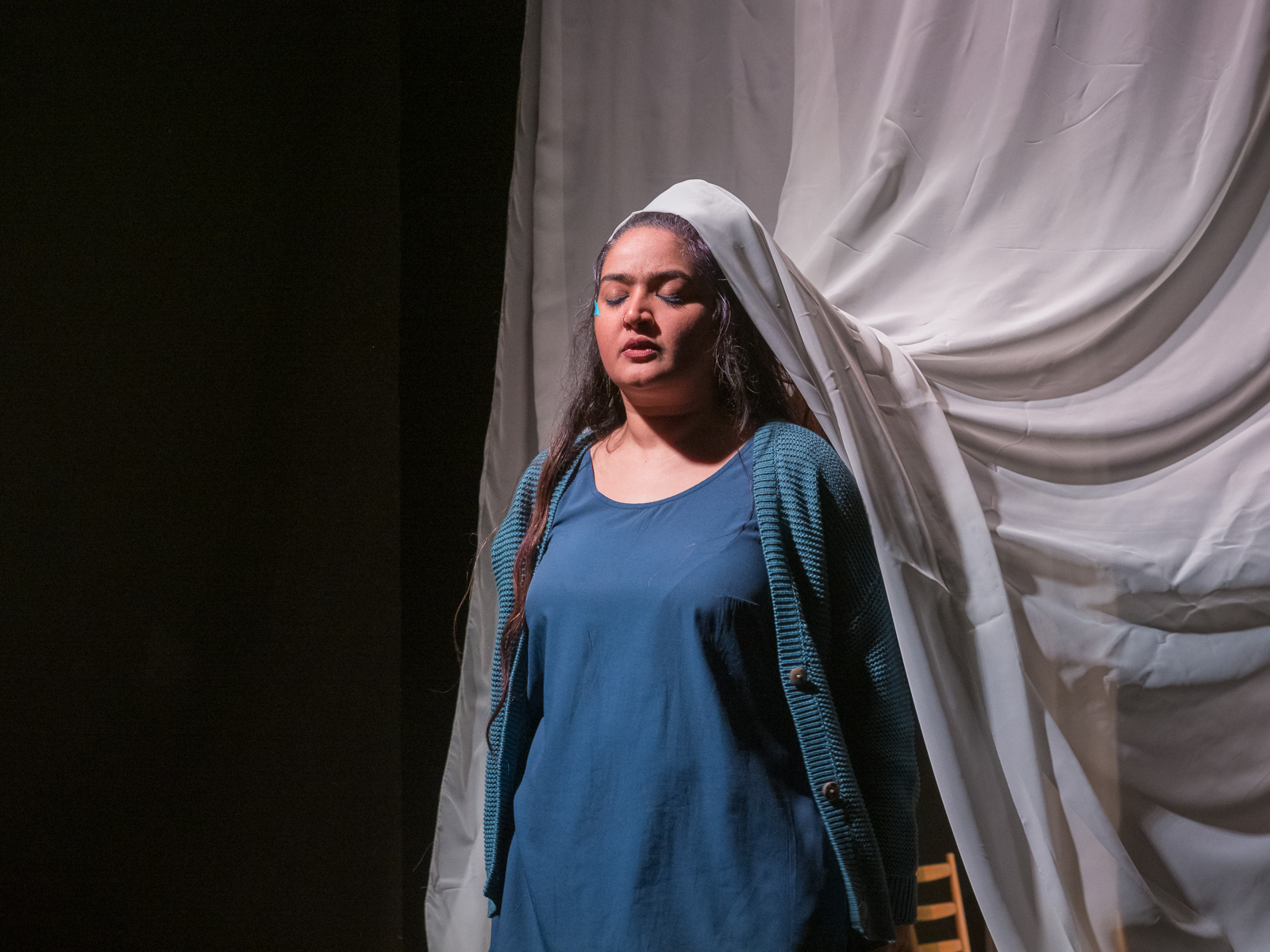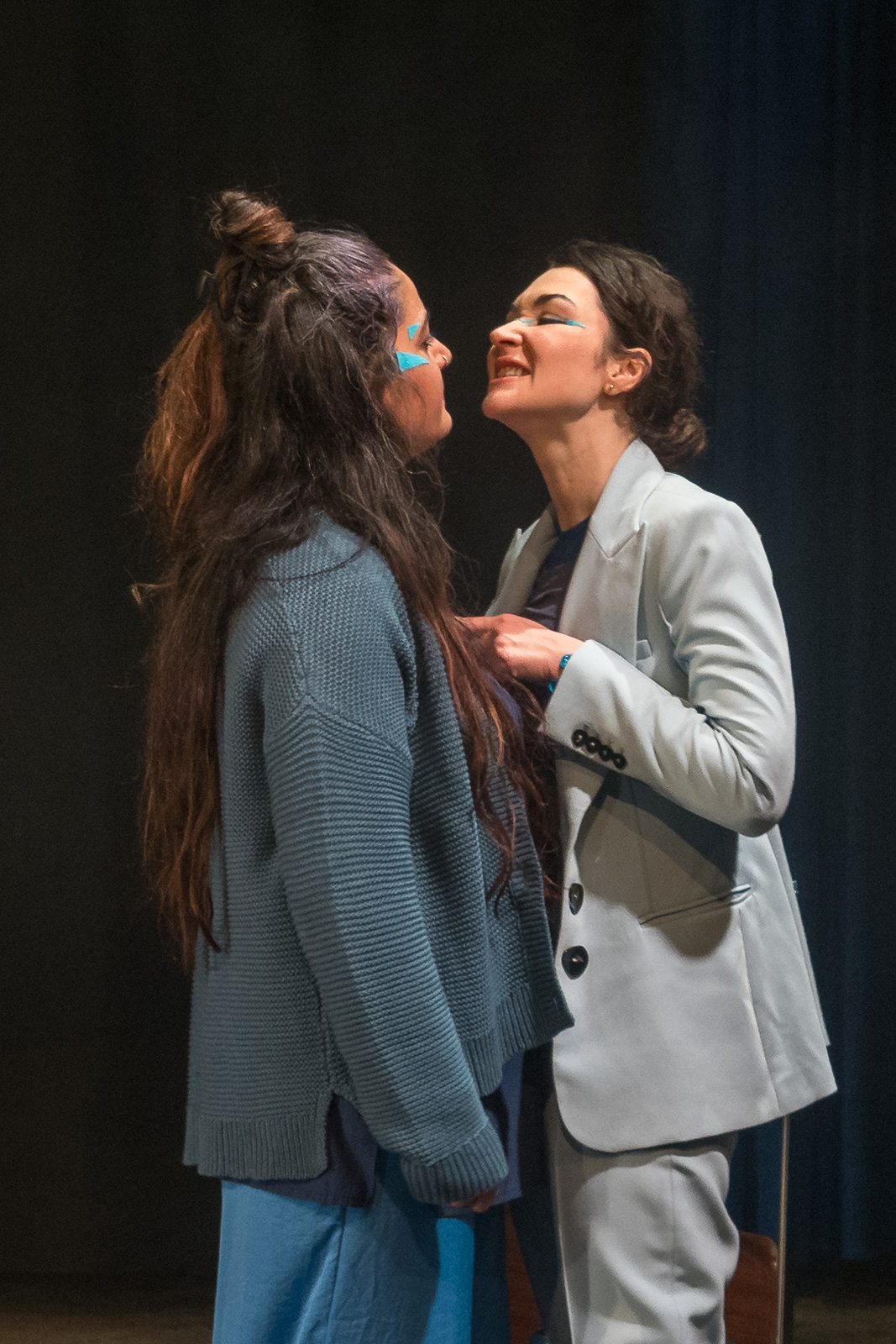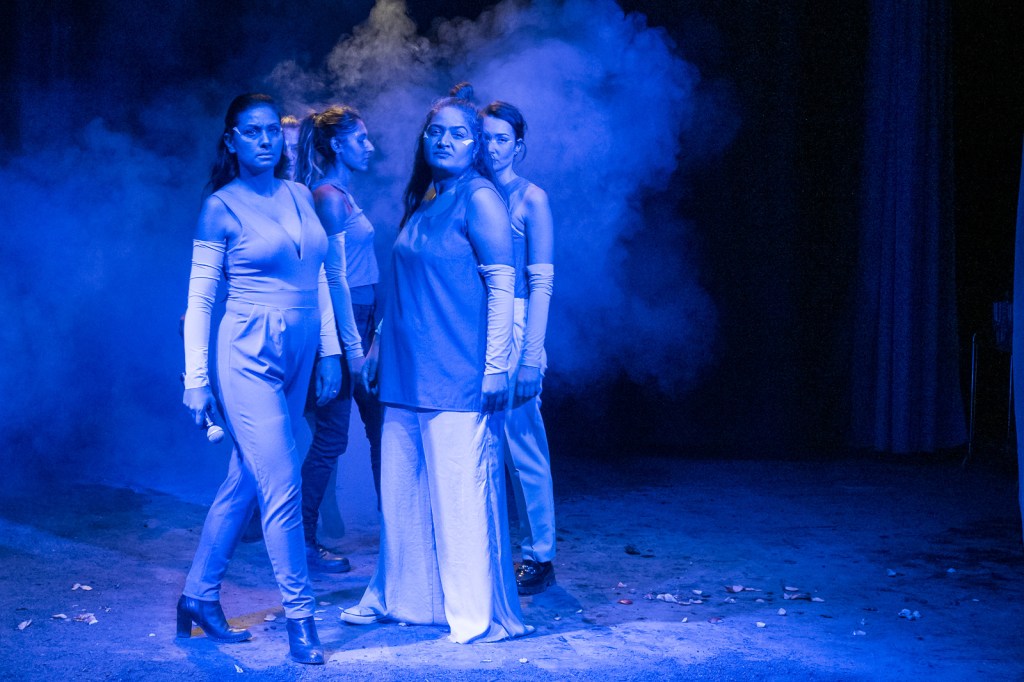What if you never knew your cultural identity? If you were not aware of your heritage, because, somehow, your mother “forgot” to mention it to you? And why? Those are the questions asked in this highly engaging and topical play “Bibi Sara Kali” by Ibrahim Amir and Simonida Selimović.
I was lucky enough to be able to watch and photograph a final rehearsal and can share some stage scenes here.

The story is simple, yet full of complex layers. It is fiction, but not fantasy. Three Viennese sisters, whose terminally ill mother Jelena wanted to travel to Serbia one last time to celebrate the feast of Bibi Sara Kali, the “Bibijako Djive”, in her home country, which she has not visited in decades. But after the celebration, she passes away, and her three daughters Snežana, Melisa and Tanja find themselves travelling together to a country they do not know anymore, to arrange her funeral.


The two older sisters moved to Vienna with their mother three decades ago as children, while the youngest was born there. They have hardly had any contact with the family in Serbia — nor with each other in recent years, it seems. That they have a Romani heritage, they may know, but this identity was kept a secret in Vienna, and the sisters know very little about Romani traditions. And so they try to find answers to questions of their own identity. It is the youngest sister who seems most interested in her Roma heritage, while the middle sister has tried to distance herself from it. What do they learn about their mother, about their family, about their people´s history? You will just have to watch the play to find out.
The Viennese author Ibrahim Amir, Simonida Selimović, and the ensemble have together developed a tragic story with some comic elements, based on the centuries-long history of the Roma and on current incidents. Simonida had the idea to produce “Bibi Sara Kali” based on her personal experiences. The multitalented Simonida is herself an Austrian born in Boljevac (Serbia), and for this play she is artistic director, co-author, director, actress and rapper. She has a long history of promoting artistic expressions that deal with issues of Roma history and culture. With her sister Sandra Selimović, Simonida founded the first feminist and professional Roma theatre association Romano Svato in 2010. They also created Mindj Panther, a hip-hop duo that raps in Romany, Serbian, English and German against discrimination against Roma and more generally for equal treatment of all people.




But who is this title-giving Bibi Sara Kali? She is the powerful patroness of the Roma, protector, companion, a kind of superhero. Her cult is celebrated by Roma worldwide with regional variations. The Roma communities from the Balkans dedicate a special day, the “Bibijako Djive”, the “Day of the Aunt”, to her.
If the “Kali” part of the name rings a bell, this is not so surprising. Kali is, after all, a very powerful Hindu goddess, consort of Shiva and a primordial cosmic energy, and the mother of all living beings according to that mythology. You may be aware that the Roma people originated in India, from which they began leaving some 1000 years ago and from there spread all over the world. According to one source I read, the memory of Shiva has been preserved among the Roma as O Baró Devél (in the Romani language). Kali Sara (which means Black Sara) is asked to intercede with O Baro Devel to bring luck, health and prosperity.

The multimedia staging at the wonderful WERK X-Petersplatz theatre at Petersplatz is creatively staged and intense. This stage play with video and music elements is actually a stage-adapted version of a filmed play that Simonida and her team had produced during the pandemic. When they had started rehearsals for the play “Bibi Sara Kali” in spring 2021, it quickly became clear that a premiere in front of an audience would not happen anytime soon. So they developed a theatre film together with the theater and film director Nina Kusturica. The acclaimed film premiered in June 2021. Two years later, with mostly a new cast, they produced this adapted version for the stage.






I loved the multimedia aspect of the play, the projections on transparent curtains that created multiple layers – as layered as the story, in a way.




For a variety of reasons, largely due to discrimination and stigma, many Romanis prefer not to register their ethnic identity in official censuses. There are an estimated 10 to 14 million Romani people living in Europe alone. In Austria, and elsewhere, there are many preconceived notions and prejudices about the Roma people. It is not easy for Roma people to “out” themselves as such. There is still a lot of stigma attached to it, although cultural associations have been formed and education initiatives are trying to improve understanding of Romani culture. Simonida told me that it is difficult for many to face the shame, to become visible and to speak about those issues. Slowly though, visibility is getting better thanks to initiatives such as this one.

Simonida is actively involved in several cultural projects. With her team she wants to bring more women’s issues such as sexism, racism, socially relevant issues, but also the history of the Romani people to the stage. She also hopes to bring the theatre closer to the Romani community in Vienna and elsewhere. Through her team´s theater and video work they want to tell the community´s story from a Romani perspective. That is something that has been missing, as most stories about the Romani have in the past been told by non-Roma, but rarely Romani people themselves. Simonida dreams of establishing a dedicated Romano Svato Theatre in Vienna.
It is well worth going to see this play, you may learn something that may surprise you, and you will surely be impressed by the vibrant staging. I do not want to spoiler anything. Suffice it to say, amidst the very serious and sometimes painful dialogue, there are also some very awesome rap interludes that blew my mind.
The play is in German, but if you want more information in English, there will be an EXPERT* TALK this coming Saturday, 04 Feburary 2023 at 8.30 p.m.
With: Ibrahim Amir (Author), Valentina Eminova (Actress), Simonida Selimović (Director and more) und Moderator: Carmen Gheorghe
free entry
Production details:
Cast: Zeynep Alan, Jasmin Behnawa, Valentina Eminova, Ingeborg Schwab, Ljubinka Nikolić, Simonida Selimovic
Text: Ibrahim Amir, Simonida Selimovic
Production: Simonida Selimovic
Music: Mindj Panther
Stage and costume: Mira König
Set and costume adaptation: Geraldine Massing
Dramaturgy: Veronika Maurer
Assistant director and choreography: Danilo Jovanović
Film recordings: Nina Kusturica
Production manager: Iva Marković
The play is a production by Romano Svato in cooperation with WERK X-Petersplatz.
The play premiered last night, 31 January, which just happens to be the Day of the Aunt. Happy Bibijako Djive, team!
Other performances on 2, 3, 4, 8, and 9 February 2023 (in German).
More about why Simonida does what she does in a DW Interview (in German) – watch the video too!

All photos © Karin Svadlenak-Gomez
P.S. I have to say it – “free advertising”, I am not getting paid by anybody to write this.
